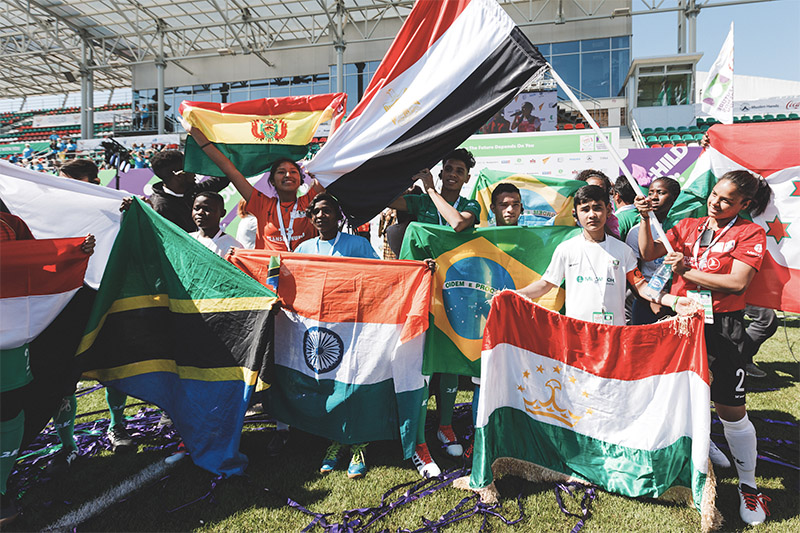
There was more than one World Cup in Moscow this summer – one event brings together people from all over the planet to change negative perceptions of street children
6 August ~ The Street Child World Cup, organised by UK-based charity Street Child United, aims to give a voice to street-connected young people from around the world. The third tournament was staged in Moscow from May 10-18, the previous two having been in Durban and Rio de Janeiro. For many children, the freedom to play outside with a ball at their feet before heading home to a meal and the security of a family home is customary. But for the 216 players from 24 teams attending the boys’ and girls’ tournaments, and millions like them, that idea is as far removed from real life as it is possible to get.
“This is a unique experience. I’ve been able to meet people from all over the world, connect with different people from other cultures and backgrounds, and learn,” said 16-year-old Deyna Mamani Mejia from Bolivia, following a win against Mexico in the tournament’s group stages. For the goalkeeper from La Paz, the chance to play football at an international tournament is a once-in-a-lifetime opportunity, and the teenager is accompanied by her younger sister Laura, who is also in the squad. Both embarked on the 8,000-mile journey to eastern Europe to change negative perceptions of street children.
“It’s not something I could ever imagine before. Back home we sometimes fight a lot but when we play football it would always unite us, and now in Russia, we can play together, represent our county together, act as ambassadors, meet new people, go to new places, hear different languages, it’s incredible.” For ten days all the players, representing and supported by charities from their home countries, become global advocates for the rights of those who are homeless or affected by life on the streets in some way.
Deyna’s younger sister Laura attests to feeling a wider responsibility. “I’m very proud to represent Bolivia and Latin America with my sister, this experience will open a lot of doors for us, but also give us the chance to help others back home who have also experienced struggles in their life,” she said.
The Bolivian girls made it as far as the quarter-finals before being beaten 2-0 by England, from the Centrepoint charity in the UK. Subsequently, England were beaten by Tanzania, though they did win the third-place play-off. Reigning champions Brazil defeated Tanzania in the final..
Despite the enthusiastic celebrations of the girls from the Penha favela in Rio de Janeiro and heart-warming celebrations of the Uzbekistan boys’ team, who beat favourites Pakistan in their tournament, winning is merely a bonus. “Football for me is not only a game, it lifts me, it cheers me up. This is where I’ve met my friends, my family who I play with – this team is like a family,” said Ana Carolina, following Brazil girls’ defeat of Tanzania in the final. “I will tell the people of Rio de Janeiro about this experience I have had.”
There is much more to the Street Child World Cup than the football. Away from the pitch, the young people take part in an arts programme, exhibiting their nation’s cultures and heritage through crafts and performances. It’s here that the stories really begin to resonate. Treated as footballers for a week – giving interviews, training, travelling and bonding as a squad – it is easy to forget that the players are children and their experiences of the street are real. Take, for example, three of the Kenyan team, who have had to return to juvenile prisons known as rehabilitation schools, where they are serving sentences after being rounded up on the streets.
Football’s universal popularity provides a crucial platform for these young people. Following finals day the teams took part in congress sessions, culminating in a general assembly at which each delivered a statement to their governments about their rights, which have, in almost all cases, been completely overlooked.
For many of the young people involved, travelling to Russia proved to be a challenge in itself, with a lot missing legal documentation such as passports, or even birth certificates – a key and universal demand from the general assembly. Nonetheless, they made it to Moscow, and they made their presence felt – remarkable ambassadors for the power of the sport to play a role in positive social change. Robson Friend
Photo by Leseya Guseva
This article first appeared in WSC 377, July/August 2018. Subscribers get free access to the complete WSC digital archive – you can find out more here
